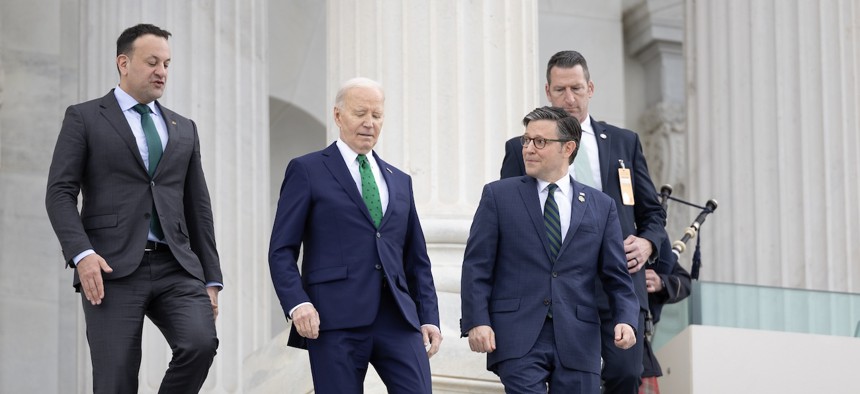
President Biden (second from the left) and House Speaker Mike Johnson, R-La., (third from left) walk down the east steps of the Capitol on March 15, 2023. Biden has thrown his support behind the new funding deal appropriators have worked out. Tom Brenner/Getty Images
Congress, White House lock in a funding deal but face a tight timeline to avert shutdown
Appropriators are racing to finalize the text of the six-bill package.
Updated March 19 at 4:11 p.m.
Congressional leaders and the White House have agreed to a funding package that would end the shutdown threat for the rest of fiscal 2024, though lawmakers now have a tight schedule to send the measure to the president’s desk before some agencies would be forced to shutter.
Negotiators have reached a deal on the final six appropriations bills Congress must pass each year, they announced Tuesday morning, which will now be considered under one “minibus” package. Funding for the departments of Defense, Treasury, Homeland Security, Labor, Health and Human Services, Education and State, as well as other agencies, is set to expire at the end of the day Friday. If Congress fails to act on time, more than 600,000 federal employees would face furloughs.
Appropriators are still finalizing the text of the package, leaving some uncertainty for when Congress will vote on it. House Speaker Mike Johnson, R-La., has vowed to give his members 72 hours from the time a bill is introduced until a vote. In the Senate, any one member can delay expedited bill consideration. Those hurdles could make it difficult to get the forthcoming minibus to President Biden’s desk without either at least a short funding lapse or another temporary spending bill.
If Congress waits until the weekend to approve the measure and Congress does not pass another continuing resolution, the Office of Management and Budget could opt to delay any shutdown procedures citing the imminent passage of appropriations.
“Senate and House leaders and the White House have reached an agreement to finish the final set of full year appropriations bills,” Senate Majority Leader Chuck Schumer, D-N.Y., said on Tuesday. He and Johnson said the relevant committees were finalizing the bills and a vote would happen as soon as possible.
Sen. Susan Collins, R-Maine, the top Republican on the Senate Appropriations Committee, said on Tuesday whether Congress can wrap up its work without another CR would depend on exactly when the bill text is made available and if Johnson adheres to his 72-hour rule.
"I don't know whether that's going to mean we're going to need a short—very short—CR," Collins said. She declined to speculate on the package's prospects in the Senate, saying only that it was "very important to avert a government shutdown."
The Senate is scheduled to go on recess at the end of the week, which some lawmakers speculated could allow for hastened consideration of the measure. Sen. Ron Johnson, R-Wis., said he "provided a list" to leadership of amendment votes and as long as he receives those votes, he will agreed to an expedited voting schedule "so we can get out of here."
"This is the United States Senate," Sen. Lisa Murkowski, R-Alaska, said. "We're motivated by recesses."
The leaders had hoped to release text of the minibus over the weekend, but talks stalled as leaders in both parties and the White House have failed to come up with a plan to fund DHS. While overall funding for non-defense spending is set to stay essentially flat relative to fiscal 2023, the White House was seeking a boost for DHS to alleviate the pressure it has faced at the southwest border.
“DHS needs a bill that funds operational pace,” White House Press Secretary Karine Jean-Pierre said on Monday. “That is what the White House is fighting for.”
President Biden on Tuesday threw his support behind the new deal.
“We have come to an agreement with congressional leaders on a path forward for the remaining full-year funding bills,” Biden said. “The House and Senate are now working to finalize a package that can quickly be brought to the floor, and I will sign it immediately.”
The minibus would be the second of the year. Agencies employing roughly 600,000 federal workers received full-year appropriations earlier this month.
This story has been updated with additional comment.







